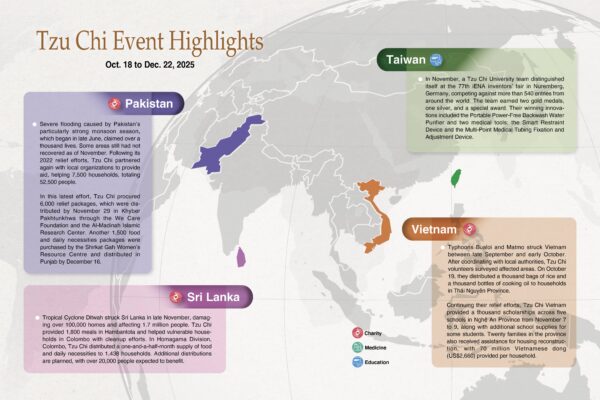By Yeh Tzu-hao
Abridged and translated by Wu Hsiao-ting
Photo by Yan Lin-zhao
From planting seeds and tending crops to harvesting, transporting, and cooking, the journey of food from the field to our dining table is far from simple.
“Look, earthworms!” an elementary student exclaimed while pulling up some amaranth plants from the soil, alerting his peers to be mindful of the creatures below.
The elementary division of Tainan Tzu Chi Senior High School maintains a small kitchen garden on campus, where parent gardening volunteers and students participating in the U.S.-Taiwan Eco-Campus Partnership Program grow various vegetables and fruits. Every Friday morning, these adults and children put on cotton gloves, grab hoes and shovels, and get to work cultivating the garden together.
They were harvesting amaranth on this particular Friday morning. Pesticides are eschewed in the garden, but not even holes in the leaves caused by cabbage worms could dampen the enthusiasm of the children as they proudly held up some of their amaranth harvest, showcasing their accomplishment. Due to campus food safety requirements, the garden’s produce cannot be added to school lunches. Instead, any harvested vegetables are taken home by volunteers and students, distributed to staff, or given as gifts to visiting guests.
Once the harvesting was complete, the gardening volunteers showed the children how to prepare the soil for planting new vegetables. A white-haired volunteer then guided the students in evenly dispersing water spinach seeds on the vegetable bed where the amaranth had been, reminding them to be gentle when covering the seeds with soil. She mentioned that in just three days, they would be able to see the seeds sprouting.
The farming activities began at eight o’clock and concluded in about half an hour. During this time, the students completed tasks such as harvesting, soil preparation, seed sowing, fertilizing, and watering. Despite the sweat on their faces and the dirt on their hands and legs, everyone enjoyed the process. It was mid-April; the vegetables would be ripe for harvest by late May or early June.
“This kind of agricultural labor is hard to experience nowadays unless parents specifically take their children to the fields on weekends or holidays,” said Xu Rong-sheng (徐榮勝), chairman of Tainan Tzu Chi Senior High School’s Parents’ Association. “But here at the Tzu Chi school, we have the opportunity to experience farming right on campus.” Xu, who was volunteering in the garden that day, shared that he became a gardening volunteer when his son was in second grade at the school. Though his son is now in eighth grade, he is still leading elementary students to cultivate vegetables.
“Growing vegetables isn’t easy,” Xu added. “From germination to maturity, it requires a lot of care. When children understand how vegetables are grown, they will better appreciate what’s in their bowls and be more likely to finish their food.”

Students in the elementary division of Tainan Tzu Chi Senior High School harvest amaranth plants on campus. Participating in farming activities helps children develop a connection with the earth and nurtures a sense of gratitude for their daily food.
Food and agricultural education
Many parents struggle to persuade their children to eat vegetables and are often met with resistance, such as tightly closed mouths or tears. A psychological experiment at Yale University showed that toddlers aged eight to 18 months instinctively avoided real plants when presented with both man-made and natural objects. This avoidance is possibly an evolved survival mechanism to avoid potential poisoning or harm from thorns or fuzz. Understanding such instinctive behaviors highlights the importance of teaching children about a balanced diet and the origins of their food. Effective food and agricultural education is essential in shaping healthy eating habits and fostering a deeper appreciation for food.
Taiwan has been making efforts to promote food and agricultural education, as evidenced by the recent passing of the Food and Agricultural Education Act in April 2022. This legislation outlines six key principles: supporting local agriculture; promoting balanced diets; reducing food waste; preserving and innovating food culture; strengthening the link between food and agriculture; and advocating for sustainable local production and consumption. Encouraged by the Ministry of Education, many teachers and students visit produce farms, fisheries, livestock farms, and food processing plants to learn more about food production. Many schools even grow vegetables and fruits on campus or raise chickens to lay eggs, providing students with hands-on learning opportunities right at school.
The kitchen garden at the Tainan Tzu Chi school mentioned earlier was created even before the Food and Agricultural Education Act was passed. Yen Hsiu-wen, the director of academic affairs in the elementary division of the school, views the garden as a “landscape dining table,” allowing children to cultivate and witness the growth of fruits and vegetables they regularly consume. “Through observing, recording, and reflecting on how a tiny seed grows into a mature plant,” she explained, “children come to understand that cultivating vegetables is no simple task. They also learn that food goes through additional steps, such as transportation and cooking, before it ends up on our dining tables. Appreciating the effort involved helps develop a deeper sense of gratitude for our food.”
Successful food and agricultural education should foster a sense of connection with and care for food, the land, and all those involved in the food production process. Professor Chiu Yie-ju (邱奕儒), the director of the Master’s Program in Sustainability and Disaster Management at Tzu Chi University, in eastern Taiwan, pointed out that one of humanity’s most severe problems is the lack of understanding about how our food grows from the land, resulting in a loss of connection with the earth. When people reconnect with the land, they naturally gain security and develop inner confidence.
“Food and agricultural education should start as early as possible,” Chiu asserted. Understanding how food is grown and harvested helps cultivate much-needed virtues, including an appreciation for food, mindfulness of reducing waste, and respect for the environment.



